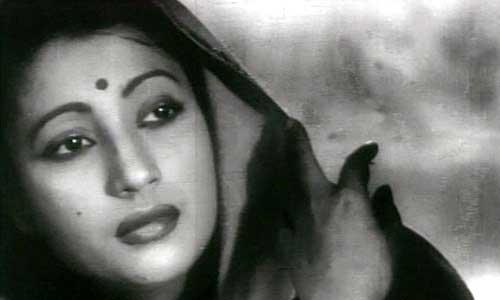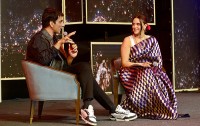 NIL
NIL
The Moviestar and the Scribe
The Garbosque life of more than three decades and half has only mystified the aura around Suchitra Sen. As the screen goddess of Bengali cinema whom India remembers for her Bollywood roles opposite actors like Dilip Kumar (Devdas), Dev Anand (Bombai ka Babu) and Sanjeev Kumar ( Aandhi ) battles for life in a Kolkata hospital now, Gopal Krishna Roy, the only journalist with access to her even in her reclusive years, relives moments of an extraordinary friendship
A screen star was born in Tollygune studio in 1953. Mrs Suchitra Sen (now 82) appeared in the silver screen in the early 50s with her first Bengali release in 1953. It was a film called Saat Number Kayedi (Prisoner Number 7). What followed is what you call history.
Mrs Sen (I would like to refer her as that) was born in a middle-class family in Pabna, now in Bangladesh. She came to India in 1947 as a refugee. Eventually, she got married to Mr Dibanath Sen, who was from an aristocratic family of Kolkata’s residential enclave for the rich and famous then, Ballygunge Place. Her surname before marriage was Dasgupta. She was Rama Dasgupta.
The name Suchitra Sen was given by Assistant Director Nitish Roy since Rama Sen was very small and uninteresting for a movie star. Many then felt that her role as Bishnupriya in the film Bhagaban Srikrishna Chaitanya in the same year was the turning point of her career and the beginning of a magical celluloid journey.
My acquaintance with the legendary actress began with a rather messed up incident. In those days, in the 70s, there was a debate going on in Indian Parliament on whether government would allow kissing scenes in cinema or not. The House vehemently opposed kissing scenes. At the backdrop of the Parliament’s decision I (then a journalist with news agency UNI) prepared a questionnaire on kissing and sent it to ten celluloid luminaries, including Satyajit Ray, Mrinal Sen, Soumitra Chatterjee and of course Suchitra Sen.
All of them except Mrs Sen replied within a day or two. I contacted Mrs Sen over telephone twice or thrice but each time she avoided me by saying : All Nonsense. One day, she asked me to telephone her next day. Next day I did, her reply was serious but rather intriguing. She said: Chumban dawa ato sahaj noi (Giving a kiss is not so easy). And she laughed. Then I told her that I will file my story without her comment. That story clicked all over India and came out in various newspapers. She noticed. Mrs Sen then rang me up and said: Koi amake toh bad dite parlena (You could not completely ignore me in your story). She meant the mention of her name in my story as one film personality who refused to comment. She however invited me at her house for a cup of tea. I went and we became friends.
I had a four decade association with Mrs Sen, both of us called each other by our first names. She was loving, living, frank, smart and cheerful. She was both soft and modest and serious at the same time. A moody star, she has always been guided by her own temperament. I can recall a few instances.
It was her everyday routine to walk on the Ballygunge Circular Road after 9 pm then. Sometimes I accompanied her. One day one gentleman suddenly recognised her during on such stroll. He immediately came up to her and asked for her autograph. Suchitra Sen asked her for a piece of paper but he was carrying none. The man was in a state of confusion since Suchitra had immediately agreed to oblige him with an autograph. Then she pointed towards an empty cigarette packet on the kerb and asked him to pick it up. She signed her name on the interior white side of the packet. The man was completely stumped by her action.
Mrs Sen has been suffering from urological problem once. She asked me to find a urologist of some repute. Fortunately I had a friendship with one very eminent urologist. He came to Mrs Sen’s house in the evening to examine her one day. After an hour the doctor left the house. Suchitra then exploded in laughter. Then she told me: Your doctor held my hand for 10 minutes and would never let it go.
Another interesting story also related to her health when she had gone to be examined by a reputed lady gynaecologist, Dr Bulbul Bhattacharya. Mrs Sen went to her chamber in the evening and sat with a horde of other patients, her face partially covered by the saree. Some of the patients still recognized her and there was soon a buzz at the place. Then I had no option but to rush to the doctor’s chamber and request her to see her as soon as possible. After returning from the doctor’s chamber what Rama said was wacky: “You know what the doctor told me? She said I am still a virgin.” It was crazy for the mother of Moonmoon Sen to say so, but then she would often be like that. We just laughed.
It was really difficult for any person to accompany her by evading the crowd. Her confident and bold style of walking was easily identifiable by the people who had watched her in the silver screen for decades, and again and again.
At the Dhakineswar Kali temple she was nearly mobbed once, but her presence of mind saved her that day. She went to temple to offer puja but was identified by so many devotees waiting in the queue. We came back without offering puja that day since we were surrounded on all sides by people suddenly.
She acted in 53 Bengali films and in seven Hindi films. Out of 53, late matinee idol Uttam Kumar was opposite her in 30. They became an iconic romantic screen pair which Bengali cinema or for that matter Indian cinema never saw again. I doubt if you would ever see such on screen chemistry and magic.
Suchitra and Uttam shared a deep respect for each other and were not romantically linked off screen. She never shared much about him with me but after Uttam died, Mrs Sen kept silent almost a whole night and rushed to Bhowanipore at Uttam’s house to offer garland to her romantic hero.
She and Sanjeev Kumar were good friends too, and they would stay at each other’s place in Mumbai and Kolkata whenever they visited the city of each other. Since the Aandhi days they forged a very special friendship. She was very saddened by the death of Sanjeev Kumar.
Legendary filmmaker Bimal Roy was the man who had almost brought her to film. In 1955, she had acted in Devdas opposite Dilip Kumar, directed by Roy. Bimal Roy was related to them in some way from her in-law’s side. When Bimal Roy first saw her, he immediately said that Suchitra had every quality to be a film star. So when he himself decided to make Devdas he chose Suchitra Sen and called her in Bombay. Vaijayanthimala played Chandramukhi, a role that Meena Kumari also had wanted to do. Once Raj Kapoor had come to her with an offer but she had refused the film for some reason.
She retired after the forgettable 1978 film in Bengali, Pronoy Pasha, opposite Soumitra Chatterjee, and never ever visited Tollygune studios. For 35 years now, she is a recluse.
Besides working with Uttam Kumar, she had also worked in three films with the Dadasaheb Phalke winning Bengali actor Soumitra Chatterjee. Her 1963 film Saath Pake Badha opposite Soumitra will always be remembered and she had won international prize for her portrayal of the wife of a professor caught between love for her husband with modest means and her rich, interfering mother obsessive about her material comfort.
Mrs Sen was equally loved by Bangladeshi people.
I got calls from Bangladesh after they heard about her indisposition. They are holding a retrospective and prayed for her good health in mosques and temples. Her house in Pabna has also been reclaimed by the government.
Suchitra Sen wanted to act in the role of Kiranmayi, the strong and rebellious woman character of the Saratchandra Chattopadhayay novel Charitraheen (The Characterless).
He last wish was also to play the role of Ma Sarada. That remained unfulfilled.
Is Suchitra Sen, who led the life of a recluse since 1978, lonely? How is her life since her disappearance from limelight? Well there are many conjectures, but she once told me: I may be lonely but I am not alone.
(As told to Sujoy Dhar)
Note: Veteran journalist Gopal Krishna Roy, who had retired from UNI in 1994 but remained in touch with Suchitra Sen till a few years ago, wrote four books on her in Bengali.
Images: Gopal Krishna Roy with one of the books he wrote on Suchitra Sen. The cover of Roy’s book Suchitrar Katha.
Top Headlines
-
Entertainment
Bollywood 2025: Hits, Hype and Heartbreaks as Dhurandhar Redefines the Year
December 24, 2025
-
Entertainment
Rotary Club of Calcutta East Central celebrates centenary of iconic actor Santosh Dutta with statue unveiling
December 04, 2025
-
Entertainment
Valentyn Vasyanovychs To The Victory! wins 2025 TIFF Platform Award unanimously
September 26, 2025
-
Entertainment
Chlo Zhaos Hamnet Wins TIFF 2025 Peoples Choice Award
September 20, 2025
-
Entertainment
Sholay: Golden even after fifty years
July 04, 2025
-
Entertainment
War 2: Check out Hrithik Roshan, Jr NTR and Kiara Advani's new posters
June 26, 2025
-
Entertainment
LGBTQIA+: Icelandic film Odd Fish and Brazil's Baby win big at KASHISH 2025 film festival
June 12, 2025
-
Entertainment
Katrina Kaif named Maldives tourism global brand ambassador ahead of Modi's visit
June 10, 2025
-
Entertainment
'Queen marches to conquer': Deepika Padukone joins Atlee's AA22xA6 starring Allu Arjun after 'Spirit' exit
June 08, 2025
-
Entertainment
Dakota Johnson and Chris Martin, who were in on-and-off relationship, broke up: Reports
June 06, 2025


